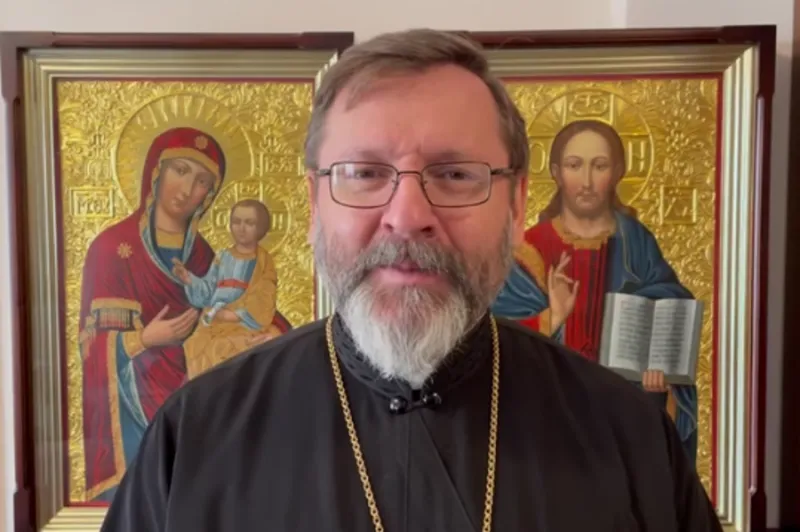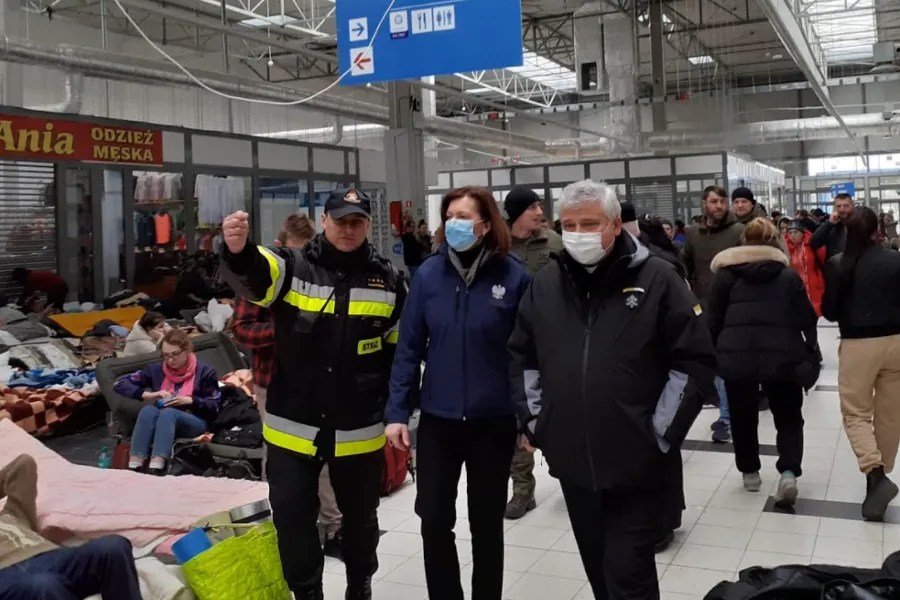
Kyiv, Ukraine, Mar 8, 2022 / 07:30 am (CNA).
The leader of the Ukrainian Greek Catholic Church said on Tuesday that Ukraine’s ongoing resistance to a full-scale Russian invasion is a “miracle.”
In a video message recorded on March 8 in the besieged Ukrainian capital Kyiv, Major Archbishop Sviatoslav Shevchuk compared the war to the 1920 “Miracle on the Vistula,” when outnumbered Polish forces defeated Russia’s Red Army.
“Today is March 8, 2022, and Ukraine is experiencing the 13th day of this horrible war. That which is taking place on the territory of our homeland is being called the ‘Miracle on the Dnipro’ by some historians,” he said, referring to the river running through Ukraine, also known as the Dnieper.
“Something similar took place almost 100 years ago on the Vistula, when the Polish army stopped the invasion of the Red Horde, and stood up for independence, the right for the existence of the revived Polish state.”
He went on: “Today, that Miracle on the Dnipro is being forged by our Ukrainian army, stopping this latest invasion of our northern neighbor, who set foot onto our land carrying destruction, carrying death, attempting to destroy the freedom-loving Ukrainian people.”
“But by the power of love, love for the homeland, by the power of the unity of the Ukrainian people — we amazed the world.”
“We are creating a miracle of a people who demonstrate their love of freedom to the whole world and amazes the whole world.”
Shevchuk recorded his latest video message as Russian forces continued to advance on Kyiv, where he is sheltering with others under the Ukrainian Greek Catholic Cathedral of the Resurrection.

The 51-year-old Church leader noted that the papal envoy Cardinal Konrad Krajewski was due to arrive in Ukraine on Tuesday.
“We would like to welcome our guest worthily and to help him truly see the wounds of Ukraine, just as the Holy Father asks him to help him touch the wounds of Christ in the body of the Ukrainian people wounded by war,” he said.
“We would like to be with him where it is most difficult today.”
On March 8, the Holy See press office confirmed a report by the Russian authorities that Vatican Secretary of State Cardinal Pietro Parolin discussed the war with Russia’s Foreign Minister Sergey Lavrov.
“The cardinal conveyed Pope Francis’ deep concern about the ongoing war in Ukraine and reaffirmed what the pope said last Sunday at the Angelus,” it said.
“In particular, he reiterated his call for an end to armed attacks, for the securing of humanitarian corridors for civilians and relief workers, and for the replacement of the violence of weapons with negotiation.”
“In this sense, finally, the Secretary of State reaffirmed the Holy See’s willingness ‘to do everything, to put itself at the service of this peace.’”
The U.N. refugee agency reported on March 8 that more than two million people have fled Ukraine since Russian President Vladimir Putin ordered a full-scale invasion on Feb. 24.
“Today Ukraine is once more in a situation where millions of people are on the move, when our women and children are forced to leave their homes,” the major archbishop commented.
“And the Church is and shall be with its people. She will be where it is most difficult. She will be where our presence is most needed, in order to embrace these people, to serve them, to ease their suffering from this war.”
Shevchuk expressed gratitude to the Catholics of Moldova, Ukraine’s small neighbor, for helping Ukrainian refugees. According to the U.N., Moldova had received almost 83,000 people from Ukraine as of March 6.
“Thank you to all those who today open their embrace before the victims of Russian aggression,” the major archbishop said, appealing for prayers for his homeland.
If you value the news and views Catholic World Report provides, please consider donating to support our efforts. Your contribution will help us continue to make CWR available to all readers worldwide for free, without a subscription. Thank you for your generosity!
Click here for more information on donating to CWR. Click here to sign up for our newsletter.




Leave a Reply